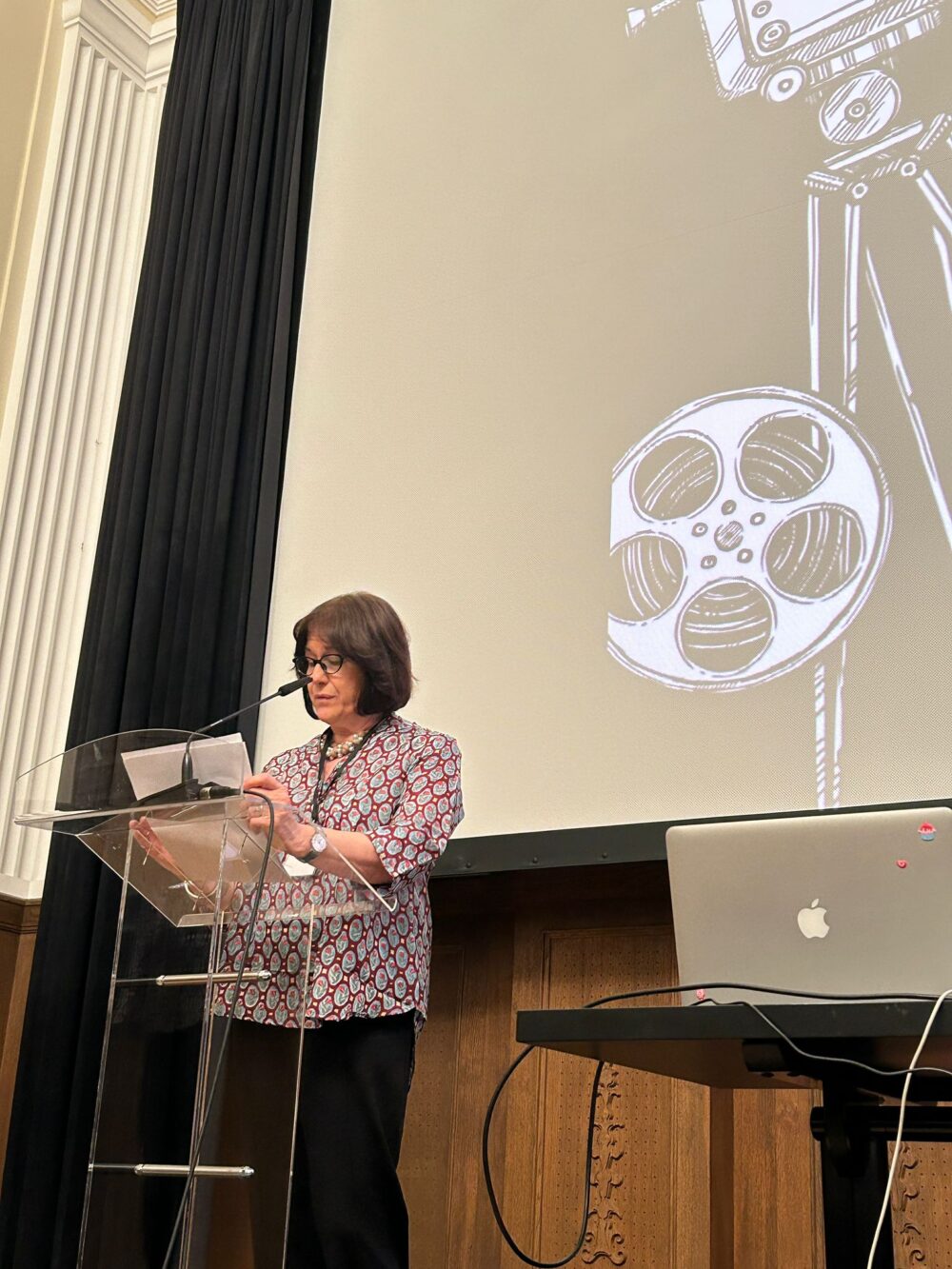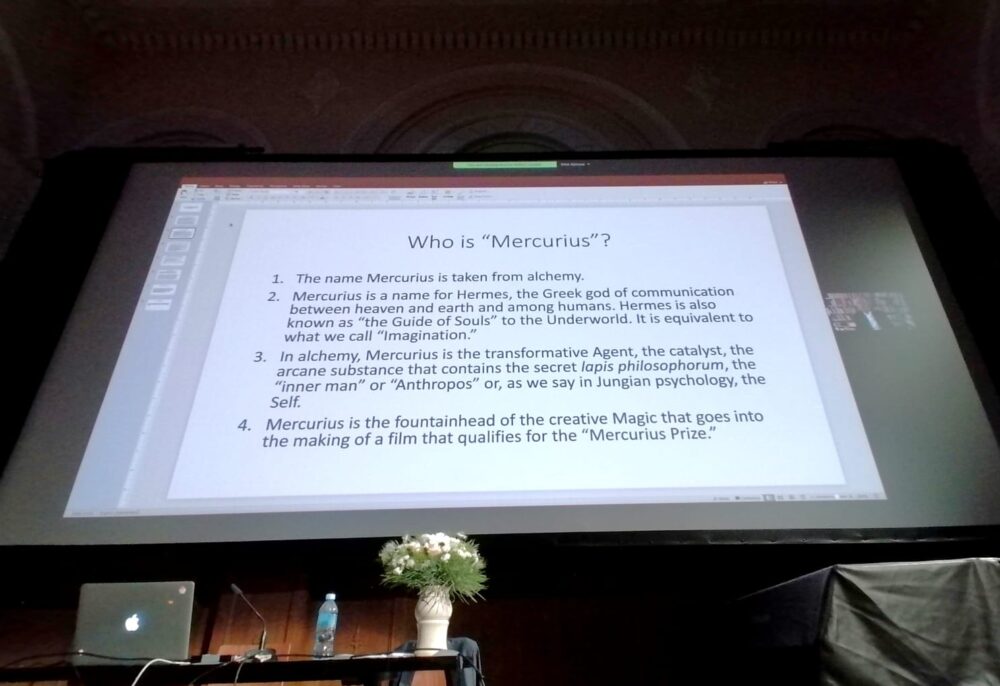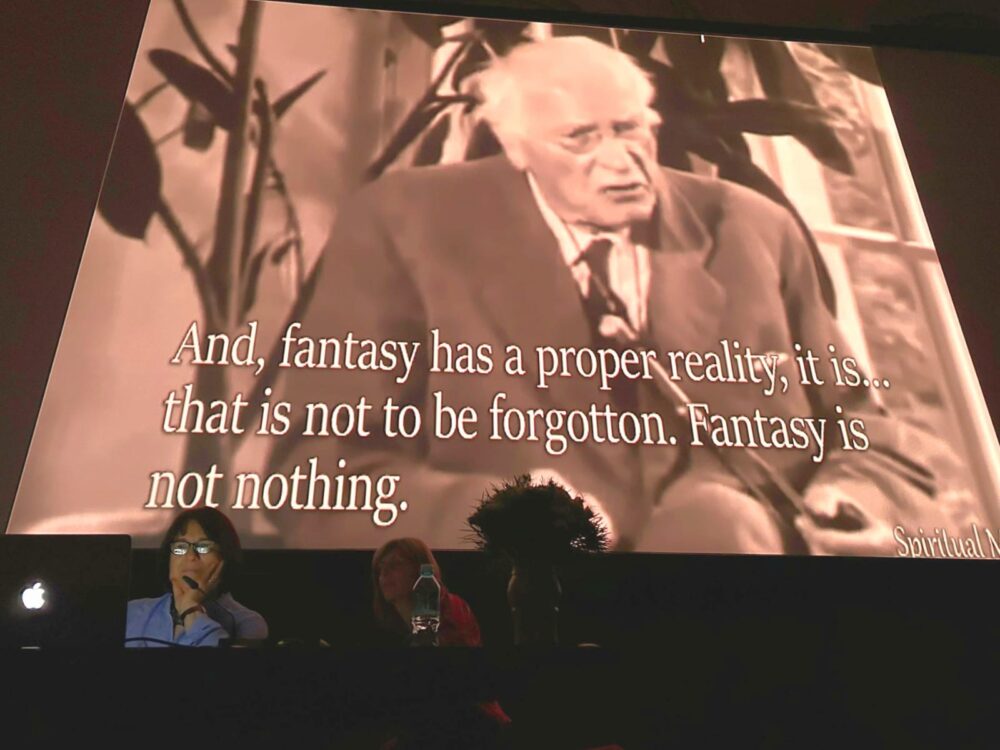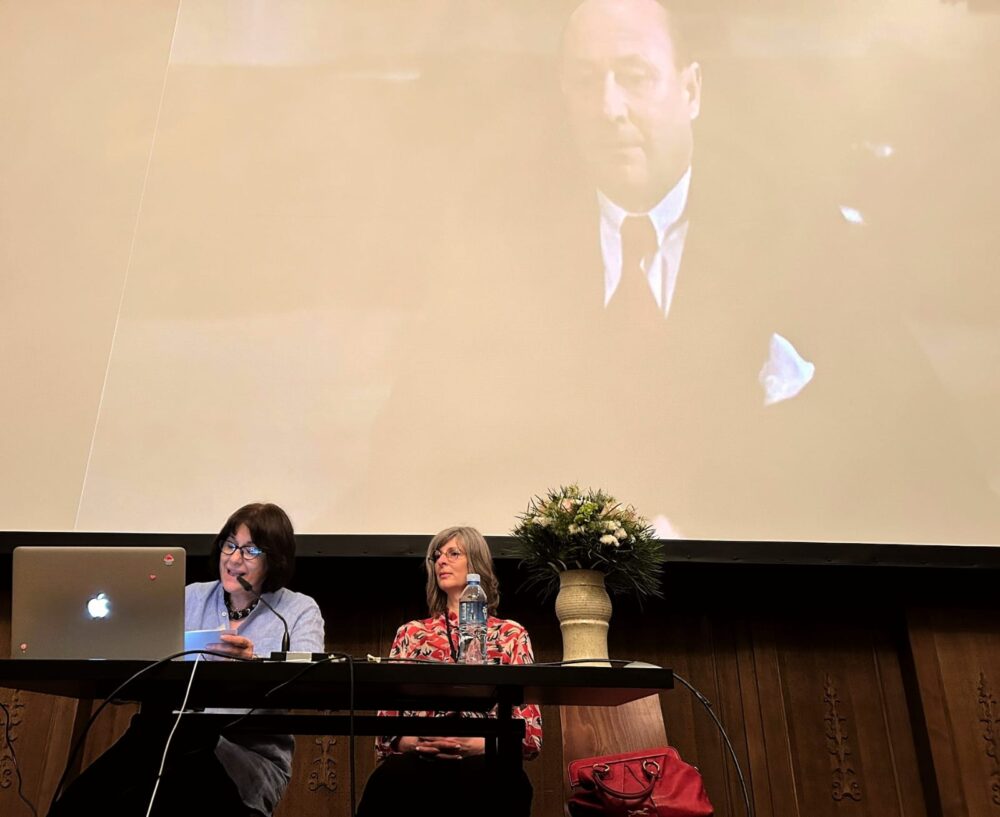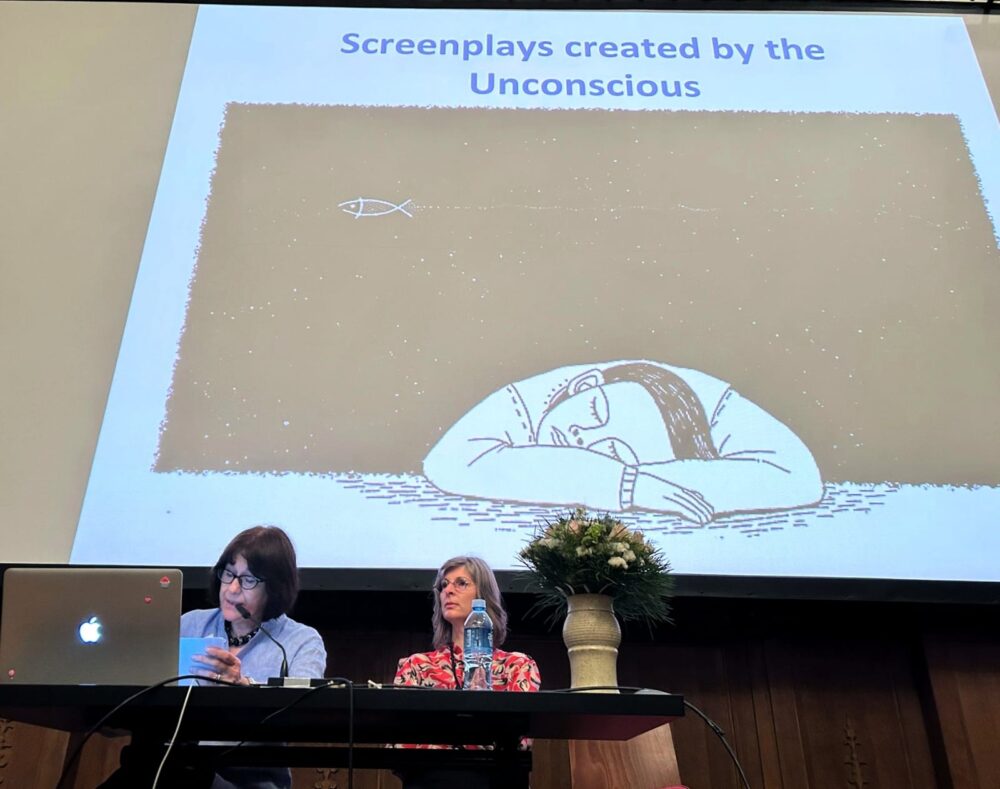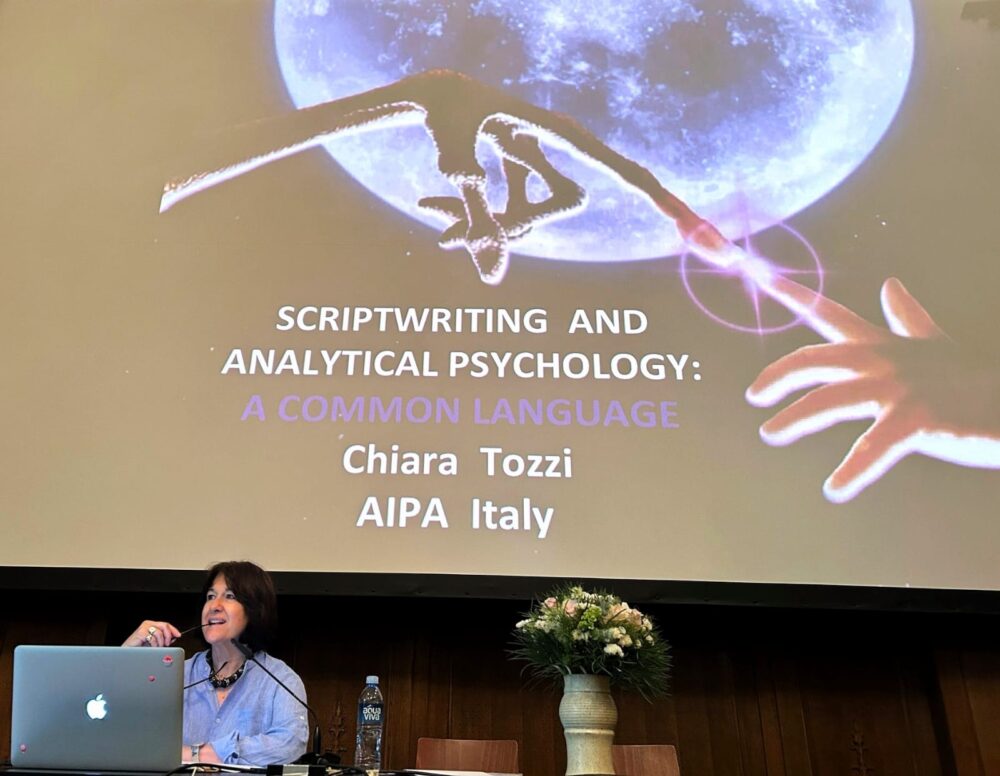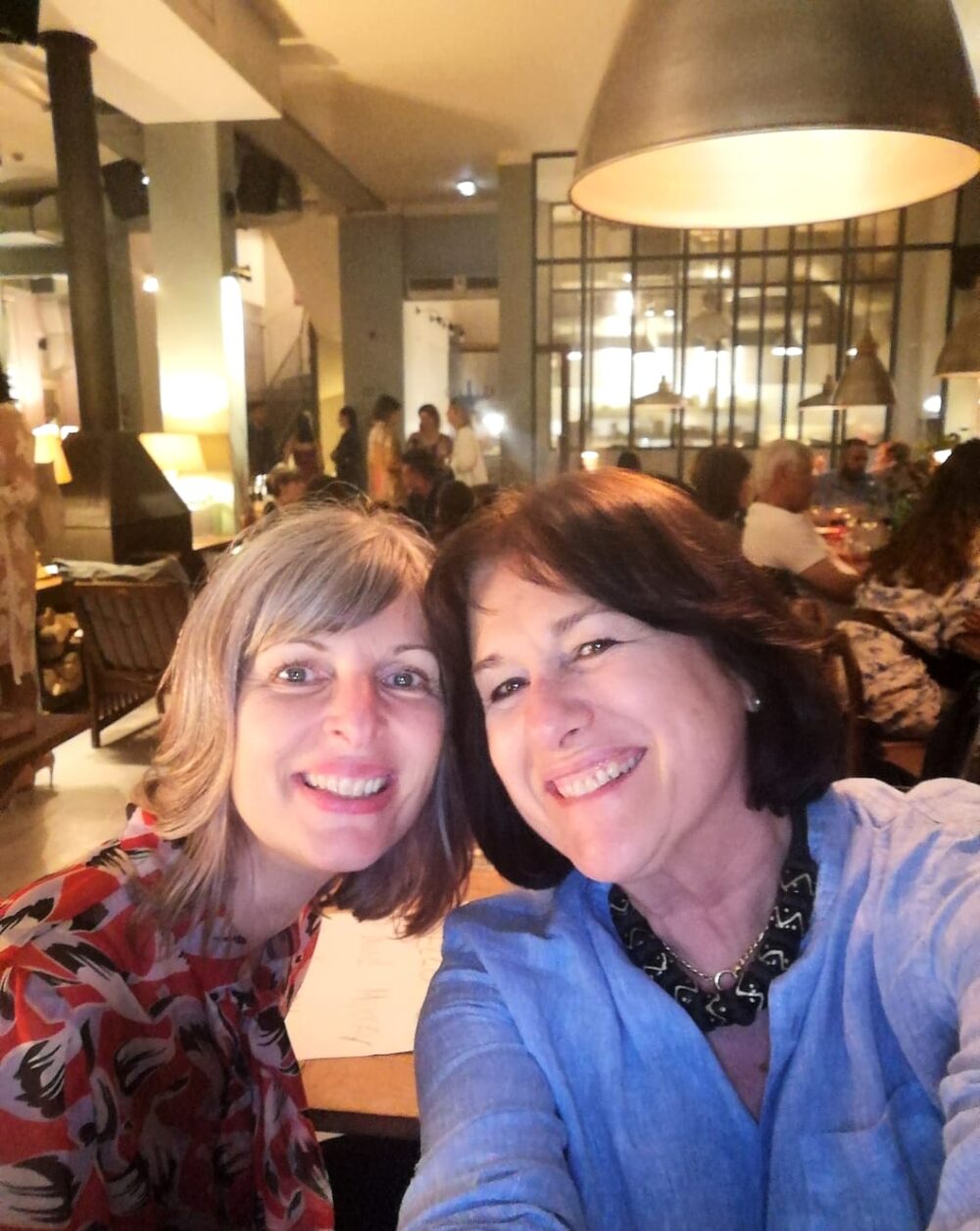Chiara Tozzi speaks on Film and Analytical Psychology

Film and analytical psychology, (the conference) aims to provide a mental space for film and analytical psychology to meet each other says the conference website. Do you think that this conjuction as took place? And with which kinds of possible results?
CT – In order to give my point of view about the result of the Film and Analytical Psychology held in Belgrade, I would like to elucidate the origin as well as the development of this project.
This idea sparked in 2018 when I was visiting Serbia to present my lecture “Facing the Waves” and to carry out my role as group supervisor as IAAP visiting professor.
My lecture was held in the beautiful Yugoslav Film Archive Museum. Ivana Radovanovic Novakovic (then SAS President), was able to organize everything in the best way possible. My experience was so remarkable that the day after, during lunch, I asked Georgije Vuletic(former SAS President) if it were possible to organize some other kind of Conference in that wonderful venue. I was wondering if we could create a connection between Serbian DG, IAAP members, routers and trainees on active imagination, films and symbolic images. Georgije answered that it was almost certainly possible to hold a Conference at the Yugoslav Archive Film Museum. I immediately shared this idea with the SAS President, Ivana Radovanovic: she too accepted the proposal with enthusiasm.
It sounded super exciting!
Then I took this project to Alessandra De Coro (then AIPA President) and I also asked for the opinion of my friend and IAAP colleague Martin Schmidt. Both found this idea very interesting.
This was the starting point of the concrete development of a very simple idea.
Ivana and I had an exchange of views via email and we concluded it would be better to go over the details before taking our project to the IAAP Executive Committee .
I had many ideas to make this project more attractive and fruitful: for example, I thought I could ask the Italian movie director Giuseppe Tornatore, if he were interested in this kind of Conference. I also told Ivana, Alessandra, Martin and Georgije that I would share this project with the Mercurius Prize Executive Committee during our next annual General Meeting. I thought that maybe Mercurius Prize Executive Committee members could be interested in this project.
And that was the case. The Mercurius Prize Committee accepted to take part in this initiative, selecting one of the five movies by Giuseppe Tornatore which I had suggested. We watched the movies and decided which one would be given the Mercurius Prize, that is “A pure formality”. I then reached out to Tornatore and asked him if I could video-interview him on his work as director with regard to C. G. Jung’s active imagination, which he knew hardly anything about. The interview was recorded by Emanuele Zarlenga in Tornatore’s projection room. We then received support from the IAAP and AIPA.
It was pretty much all ready for this Conference that should have taken place in May 2020…. but sadly we all know what happened for the following two years, starting in March 2020, due to the COVID-19 pandemic. But Ivana and I didn’t give up: when imagination is truly active and therefore connected to reality, it has very strong roots. It was like “facing the waves”; a truly globally challenging time. So, facing those waves, we postponed the Conference from one year to the other.
And eventually, we did it. The Film and Analytical Psychology Conference could have been held just in the truly incredible Cinematheque which awoke the propositional spark within me, to symbolically show that if a place has a Soul – and in this case the Soul is that of the movies, so connected to dreams and the unconscious – its resonance can activate imagination. Just like Jung believed, imagination has a lot to do with our reality as human beings, and with our way of relating both to the inner and to the outer world.
The works of the Conference were in my opinion really inspiring and exciting. We had the opportunity to listen to different points of view about the Conference’s topic, as well as to meet colleagues from different parts of the world.
We could follow inspiring and original lectures, discuss in groups, listen to the Maja Rajkovic’s magnificent piano concerto, watching an unpublished interview with Giuseppe Tornatore in which for the first time the Oscar awarded Italian director dealt with the four phases of Active Imagination. Furthermore, we attended the Mercurius Prize award ceremony, in which the Mercurius Prize Committee awarded Giuseppe Tornatore for his film A pure formality.
If I can express my personal evaluation on this event, the peculiar characteristic of this Film and Analytical Psychology Conference held in Belgrade was its powerful and emotional charge, experienced through the lectures, the discussion groups the vision of films and the convivial meetings. Also the feedback of the participants are highlighting the difference between this Conferences and other ones, because of the absence of boredom and difficulties in following lectures and discussion groups. One participant told me these precise words: “We are so accustomed to use our thinking function, both practicing and writing papers for conferences: in Film and Analytical Psychology Conference we were captured especially by the feeling function. And that made a meaningful difference!” I personally highlighted the need to “feel” and not “to think” the images1, in order to really deal with them from the point of view of analytical psychology. Both familiarizing and experiencing Active Imagination –the special legacy by C.G.Jung- helps us to learn to deal with the inner psychic images using more the feeling function than the thinking function.
Furthermore, it’s important to point out that the Cinematheque itself, with its symbolic value of a “temple of animated images”, embodied the meaning of a possible conjunction between film and analytical psychology.
At the end of the conference, an affectionate exchange of opinions between the audience and the lecturers, gave voice to the communication of shared feelings, as well as the unanimous hope to get another edition of Film and Analytical Psychology Conference
This project is actually a work-in-progress; and my goal is to carry on with other editions of the Film and Analytical Psychology Conference to create an inspiring and fruitful connection between IAAP members, routers and trainees from different countries.
I am currently working with Francesca Fabbri Fellini, niece of well-known director Federico Fellini. We are putting together the project for the second edition of the Film and Analytical Psychology Conference, dedicated to the works of Federico Fellini.
Now more than ever, I believe we need to give people all over the world an opportunity for exchange and confrontation in order to be united in diversity. Becoming familiar with images thanks to films and analytical psychology can provide excellent support in this direction.

There are films, as well as theatre shows or songs, that seem analytical sessions, as the title of your talk reminds us. How do you think cinema, music, theatre and analytical language can combine?
CT – I use to quote often this von Franz’s statement about the meaningful connection, nowadays, between film and analytical psychology:
“I believe that nowadays the cinema addresses many fundamental psychological topics, replacing fairytales and myths from the past. Movies are the modern expression of myths and fairy tales; the audience favors the ones like fairy tales that recount the inner world, as human beings greatly need myths to guide and trace the journey of the world of dreams and the unconscious.”
M. L. von Franz2
Von Franz stated that in 1988. From then on the images both of films and TV series, increasingly became the most common way for establishing a connection with our collective and individual inner world at a symbolic level. Also because of my double job as analyst and scriptwriter, I find it extremely interesting and helpful for us, Jungian analysts, to analyze the striking affinity I noticed in the analogy between writing a movie and carrying out an analytical path (Tozzi, En Route).
In my presentation “Scriptwriting and Analytical Psychology: A common language” held at the 1st Edition of the Film and Analytical Psychology in Belgrade, I highlighted how, in clinical practice, it is currently common for many patients to start describing a movie or their own active imagination as: “In the first scene you see…” Some even say “In the movie I dreamed of, it was as if…” This overlapping between movies, dreams and active imagination seems to reveal that the patient is both the scriptwriter and the protagonist of the dream or active imagination’s story, where both the storyline and the development of the scenes – meaning, the screenplay – come from the unconscious.
In fact, our unconscious is both the author and the scriptwriter; it is truly capable of creating stories as we see them in our dreams or during an active imagination. And, just like in a good movie, it almost always surprises us. Or actually, it surprises our rationality, our conscious Ego, thanks to its ability to narrate which especially develops through images, through temporal and disorienting cuts, and through the appearance of contexts, characters and plot twists that do not seem rationally predictable. You know The Red Book? Well, don’t you think that reading the stories experienced by Jung through active imagination which he wrote about and described bring along the same fascination and language used in movies? At the end of his life Jung said he had written everything with a “double meaning”, which is also the first rule of movie language, not so easy for scriptwriters and directors to understand nor to put into practice. This kind of link between the language of Film and that of analytical psychology, is in my opinion a very inspiring starting point for deepen both the affinities and differences between Film and Analytical Psychology. In the Belgrade Conference I resumed the depiction of a research on this specific topic, which begun more than ten years ago. I presented at the IAAP Congress in Copenhagen the meaning of that research, which is still developing.
1 Tozzi, C. (2020). “From horror to ethical responsibility: Carl Gustav Jung and Stephen King encounter the dark half within us, between us and in the world” Journal of Analytical Psychology, 65, 1, (ISSN 0021-4774, ISSN1468-5892).
2 Von Franz M.L (1996) Il mondo dei sogni, Tea Due, p.102 [The Way of Dream, by Fraser Boa, Windrose Films Ltd, Toronto, 1988].
